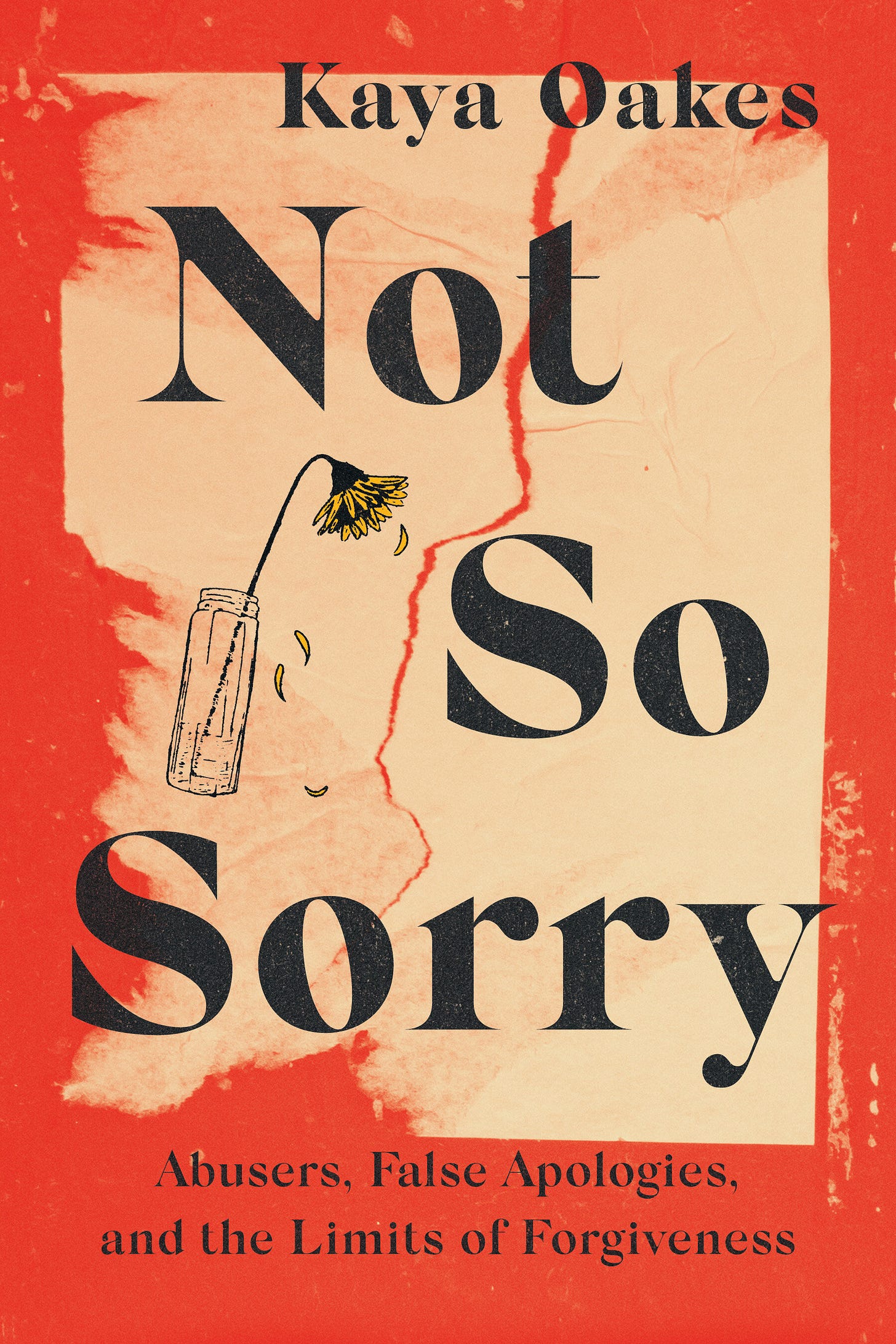On Forgiveness... and on Freeing Ourselves to Not Forgive
Not So Sorry: the book that #ChurchToo survivors need
If I had a dollar for every time a clergy sex abuse survivor has asked me about forgiveness, I’d have a shiny new espresso maker.
“Why can’t I forgive?”
“Do I have to forgive to heal?”
“Why can she so readily forgive and I can’t?”
“What would forgiveness even look like?”
“Can I still be a good person if I don’t forgive?”
These questions, and more, haunt many #ChurchToo survivors. In addition to the misplaced guilt that many feel as they struggle with forgiveness, there’s often also a quiet unspoken fear that seems to lurk just beneath the surface – the fear that, if they don’t forgive, they’ll wind up burning forever in hell.
After all, for those of us raised as evangelicals, we were inculcated in the teaching that we must forgive others in order to be forgiven ourselves.
And again and again, religious leaders have exploited that fear as they have used forgiveness theology to pressure survivors into compliance, conformity, silence, and submission, as though a survivor’s inability to forgive – or even a mere hesitancy about it – were a sin far worse than the rapes and sexual violations of a pastor.
Religious leaders claim authority to define forgiveness and to impose a timeline for it, and then they heap shame onto clergy sex abuse survivors for failing to measure up to their narrow notions – as if the survivors were morally defective.
Indeed, many survivors have been so endlessly bludgeoned with demands for forced forgiveness that they now refer to “forgiveness” as “the f-word” – as if even the sound of the word causes too much pain.
That’s how “effed up,” exploitative, and mean “forgiveness” teachings have become in the #ChurchToo arena. The very concept of forgiveness has become part of a spiritually abusive systemic pattern.
All this came to mind a couple days ago, when I watched Erika Kirk’s moving statement of forgiveness for her husband’s killer. I felt profound empathy and sorrow for the heartbreaking loss of Kirk and her children, and at the same time, I also felt concern for #ChurchToo survivors, wondering how they would process such a public display of forgiveness and what kinds of feelings it would trigger for some.
So, for any #ChurchToo survivors who are pondering it – and maybe feeling that old voice of self-criticism start to rise – here’s my suggestion: Read this book by Kaya Oakes: Not So Sorry: Abusers, False Apologies, and the Limits of Forgiveness.
Oakes writes about forgiveness specifically in the context of sexual violence – wrongs that carry a unique culture of shame – and in the context of those who are “not so sorry” for their wrongs, who repeat the same wrongs, who demonstrate no apparent repentance, and who are enabled by complicit institutions that refuse to change.
Is forgiveness owed for wrongs that persist?
This is the kind of question that Oakes ponders. As the book’s synopsis states:
“From religious communities to therapeutic spaces, the importance of forgiving those who’ve wronged us is often enshrined as an unqualified good. But what about horrifying cases of abuse, predatory behavior, or systemic wrong?”
“In these cases, forgiveness places the onus on victims, diminishes real hurt and anger, lets perpetrators off the hook, and prevents justice from being done.”
In this context, Oakes talks of how “forgiveness” is often tied to the preservation of power. That’s a reality that matches up with the lived experience of many clergy sex abuse survivors, and it’s why I think a lot of you would really like this book.
Oakes urges a more nuanced approach to forgiveness – one that relies more on models of restorative justice, amends-making, and collective repair.
And to that, I say “Amen.”
Oakes then asks an essential question: Is it ever better not to forgive?
In conclusion, Oakes offers this reflection as a sort of answer:
“We need a better definition of forgiveness, one less tied up in guilt and punishment and more focused on our mutual work to better our communities and world. And we need to understand that sometimes it is simply okay to say, ‘I can’t forgive this person, or this institution, or this historical wrong. I can’t even promise that I’ll get there eventually. I’ll try, but there’s no guarantee. And, by the way, this does not make me a bad person or a failure.’ … There are harms done that cannot be forgiven, and we need to acknowledge that, even while we also acknowledge that our understanding of forgiveness needs to evolve. Because if the ultimate goal of forgiveness is freeing ourselves from a burden, not being able to forgive should lead to a kind of freedom too. If forgiveness is supposed to be about reconciliation, community, and a return to wholeness for the person who has been wronged, for some people, withholding of forgiveness can be a pathway toward the same freedom and reconciliation that forgiveness promises.”
Not So Sorry. Find it at your local library, ask for it on an interlibrary loan, order it at your local bookstore, or get it here. I think you may find some freedom in it.



I do not forgive. I was a child.
We all know the Synoptic Jesus and his commands about forgiveness, but no one talks about forgiveness from the perspective of the Johannine Jesus. John’s Jesus is the most intimately familiar with abuse and trauma (shows his healed scars to fearful Thomas). And he never commands his traumatized brothers and sisters to forgive. He didn’t talk about forgiveness until the very end of his time with his followers; and even then, it’s just a statement of fact: “If you forgive the sins of any, they are forgiven them” (John 20:23).